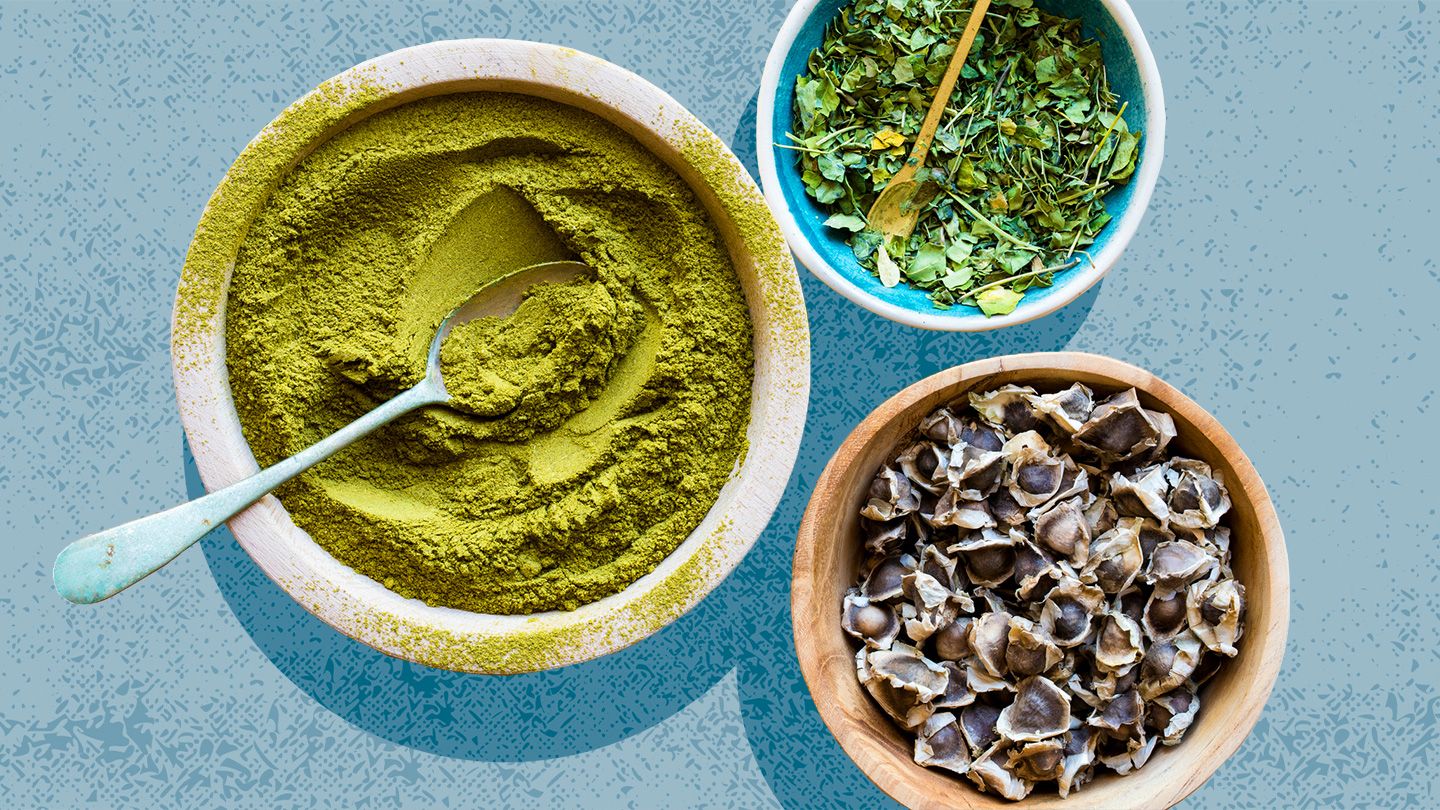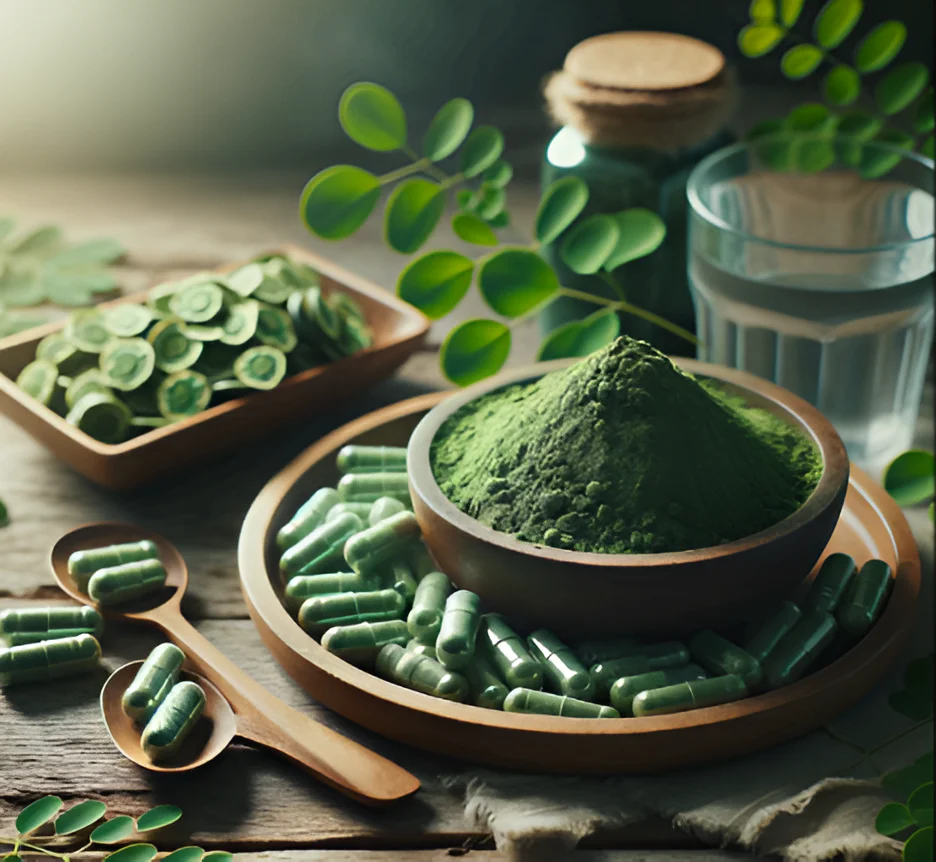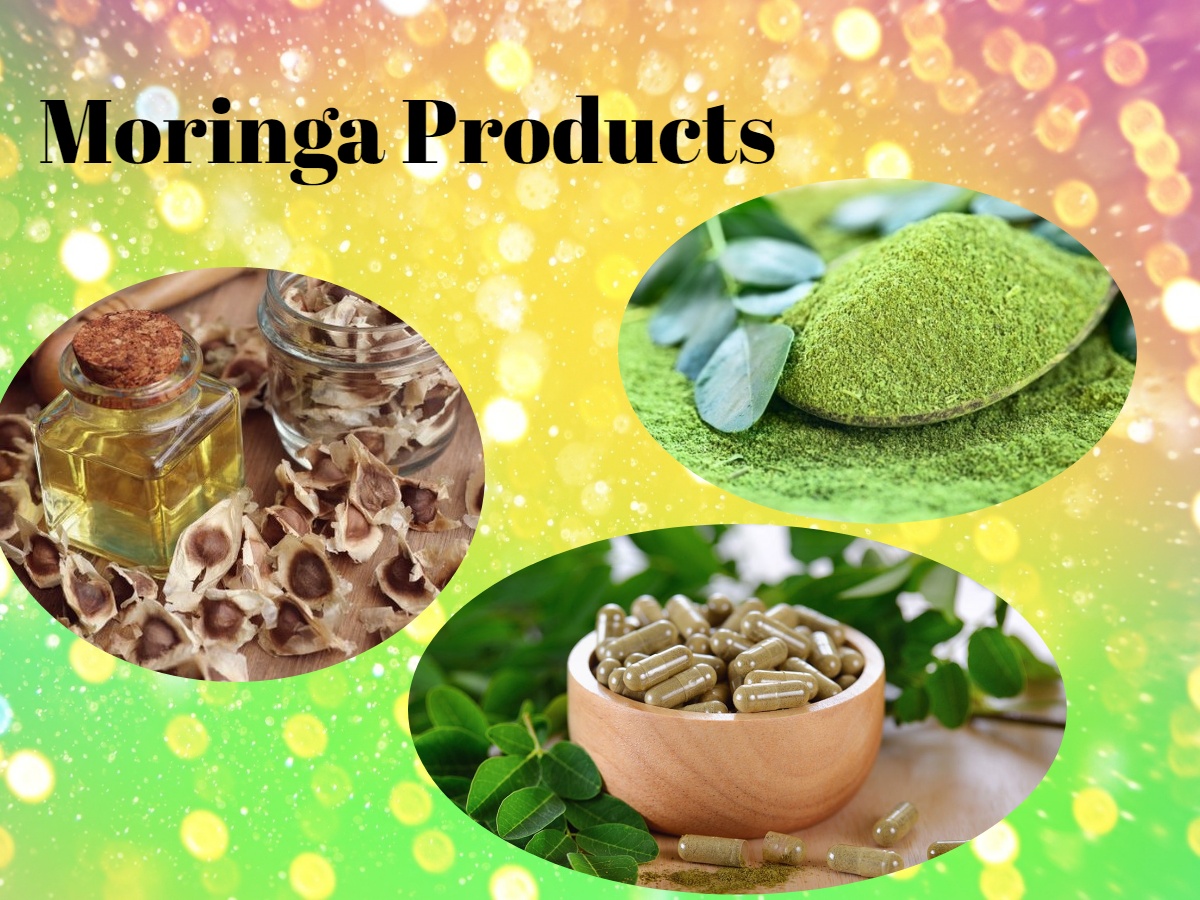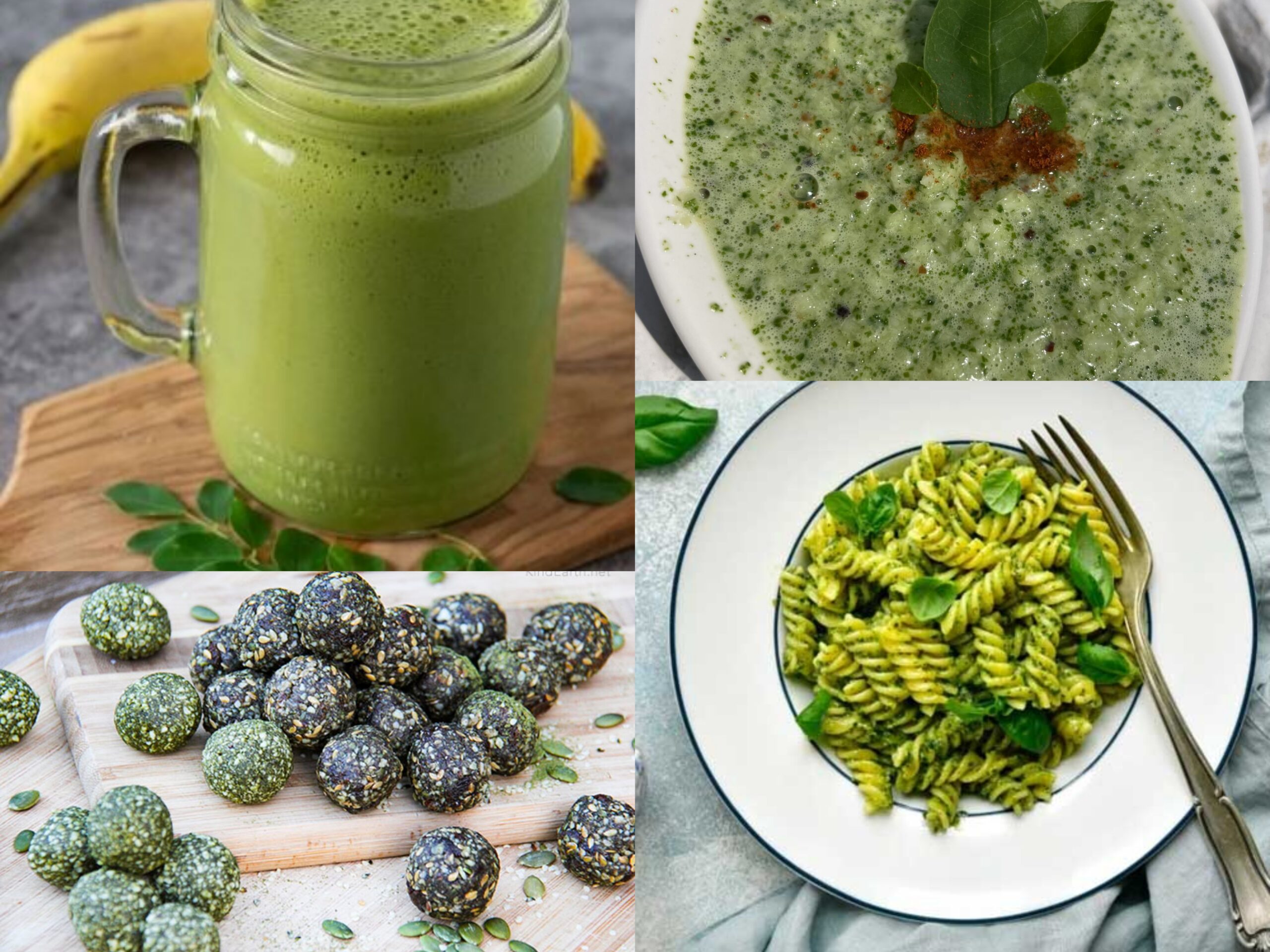Discover everything you need to know about Moringa leaf powder in our comprehensive guide to Moringa Mastery. Learn about the origins, nutritional benefits, culinary uses, and environmental impact of Moringa Leaf Powder.
Table of Contents
Introduction to Moringa Mastery
Moringa Oleifera, often hailed as the “Miracle Tree,” is an extraordinary plant that has been gaining popularity across the globe for its remarkable nutritional and medicinal properties. The leaf powder of Moringa is particularly celebrated for its versatility and health benefits, making it a cornerstone of Moringa Mastery. This comprehensive guide embarks on a journey to explore everything there is to know about Moringa leaf powder, from its rich history and nutritional content to its myriad health benefits and practical tips for incorporating it into your daily life.
Nutritional Profile of Moringa Leaf Powder
Vitamins
- Vitamin A: Moringa leaf powder is rich in vitamin A, which is crucial for maintaining healthy vision, immune function, and skin health.
- Vitamin C: With a high vitamin C content, it surpasses even oranges in its ability to boost the immune system and fight off infections.
- Vitamin E: Known for its antioxidant properties, vitamin E in Moringa helps combat oxidative stress and supports healthy skin and eyes.
Minerals
- Calcium: Moringa leaf powder contains more calcium than milk, aiding in the development of strong bones and teeth, and in the function of muscles and nerves.
- Iron: With a high iron content, it helps in combating anemia and boosting the body’s energy levels by improving hemoglobin formation.
- Potassium: It surpasses bananas in potassium content, which is vital for maintaining normal blood pressure, heart function, and muscle contractions.
Protein
- Moringa leaf powder is a rare plant source of complete protein, containing all nine essential amino acids necessary for the body to build and repair tissues. This makes it especially valuable for vegetarians and vegans.
Antioxidants
- Moringa is loaded with antioxidants such as quercetin, chlorogenic acid, and beta-carotene. These compounds help in reducing inflammation and protecting the body against chronic diseases by neutralizing harmful free radicals.
Amino Acids
- The presence of essential amino acids in Moringa supports the body’s metabolic processes and contributes to the growth and repair of muscle tissue, making it an excellent supplement for physical health.
Fiber
- Moringa leaf powder is a good source of dietary fiber, which promotes healthy digestion, helps in maintaining a healthy weight, and regulates blood sugar levels.
Phytonutrients
- Moringa contains various phytonutrients, which have anti-inflammatory and antiseptic properties, further boosting its medicinal value.

Health Benefits of Moringa Leaf Powder
1. Nutrient-Rich Profile
Moringa leaf powder is densely packed with vitamins A, C, and E, calcium, potassium, and iron, offering a robust supplement for daily nutritional needs. This nutrient-rich profile supports overall health, including vision, skin health, and immune function.
2. Immune System Support
High in vitamin C and other antioxidants, Moringa leaf powder strengthens the immune system, helping the body fend off colds, infections, and other diseases. The antioxidants fight against oxidative stress, which can lead to chronic diseases.
3. Energy Booster
Although Moringa is caffeine-free, it is a potent energy booster, thanks to its high iron and magnesium content. These minerals play a crucial role in converting food into energy and reducing fatigue.
4. Aids in Weight Loss
Moringa leaf powder can contribute to weight loss efforts. Its high fiber content promotes satiety, reducing the urge to snack and aiding in calorie control. Additionally, it helps in enhancing fat breakdown.
5. Anti-inflammatory Effects
Chronic inflammation is linked with several health conditions, and Moringa’s anti-inflammatory properties, due to its isothiocyanates, can help mitigate this risk, promoting overall health.
6. Blood Sugar Regulation
Moringa leaf powder may help in regulating blood sugar levels, making it beneficial for people with diabetes. It contains chlorogenic acid, which can help moderate blood sugar levels after meals, and compounds that improve insulin sensitivity.
7. Heart Health
Rich in antioxidants, Moringa can protect against damage to heart tissues. It also plays a role in maintaining healthy cholesterol levels, thereby supporting heart health.
8. Brain Health
The antioxidants and neuroprotective properties of Moringa leaf powder support brain health. It can enhance cognitive function and protect against neurodegenerative diseases, thanks to its high levels of vitamins E and C.
9. Digestive Wellness
Moringa is high in fiber, which is essential for healthy digestion. It helps prevent constipation, supports a healthy gut microbiome, and maintains a smooth digestive process.
10. Skin and Hair Benefits
The high vitamin A and E content in Moringa leaf powder benefits the skin by promoting collagen formation, reducing fine lines, and combating oxidative stress that leads to skin aging. For hair, its amino acids support keratin production, essential for strong, healthy hair.
11. Antimicrobial Properties
Moringa exhibits antimicrobial and antifungal properties, making it beneficial in fighting certain infections. This can be particularly helpful in wound healing and skin care.

How to Incorporate Moringa into Your Diet
Smoothies and Juices
Blend Moringa leaf powder with your favorite fruits, vegetables, and liquids such as almond milk or coconut water to create nutrient-packed smoothies and juices. The powder blends seamlessly and adds a subtle earthy flavor, enhancing the nutritional value of your drink.
Soups and Stews
Stir Moringa leaf powder into soups, stews, and broths during cooking to fortify your meals with extra nutrients. Its mild flavor won’t overpower the dish but will provide a nutritional boost, making it an ideal addition to savory recipes.
Salad Dressings
Mix Moringa leaf powder into homemade salad dressings, combining it with olive oil, lemon juice, herbs, and spices. Drizzle the dressing over your favorite salads for a nutritious and flavorful kick, elevating both the taste and nutritional content of your meal.
Baked Goods
Incorporate Moringa leaf powder into baked goods such as muffins, pancakes, and bread. Add it to the batter along with other dry ingredients to infuse your baked treats with added vitamins, minerals, and antioxidants, without compromising on taste.
Energy Balls and Bars
Combine Moringa leaf powder with nuts, seeds, dried fruits, and sweeteners like honey or dates to make homemade energy balls or bars. These nutritious snacks are perfect for on-the-go fueling, providing a convenient way to boost your energy levels throughout the day.
Yogurt and Oatmeal
Mix Moringa leaf powder into yogurt or oatmeal for a nutrient-rich breakfast or snack. Simply sprinkle the powder over your yogurt or oatmeal and stir well to incorporate. You can also add additional toppings such as fresh fruit, nuts, or seeds for added texture and flavor.
Tea and Infusions
Brew Moringa leaf powder into a soothing tea or infusion by steeping it in hot water for a few minutes. You can enjoy it on its own or add flavors like lemon, ginger, or honey to enhance the taste. Moringa tea is a refreshing way to hydrate while reaping the benefits of this superfood.
Salad Boost
Sprinkle Moringa leaf powder over salads just before serving to add a nutritional boost. Its vibrant green color and mild flavor complement a variety of salad ingredients, making it an easy and nutritious addition to your greens.
Stir-fries and Curries
Add Moringa leaf powder to stir-fries, curries, and other cooked dishes towards the end of cooking to preserve its nutritional value. Its subtle flavor blends well with spices and sauces, enhancing the overall taste and nutritional content of the dish.

Moringa Leaf Powder for Skin and Hair
Skin Benefits
- Moisturizes and Nourishes: Create a homemade face mask by mixing Moringa leaf powder with honey or yogurt. Apply the mask to your face and leave it on for 15-20 minutes before rinsing off. The mask deeply moisturizes the skin, leaving it soft, supple, and nourished.
- Anti-Aging Properties: Moringa leaf powder is rich in antioxidants, which help combat free radical damage and prevent premature aging of the skin. Incorporate it into your skincare routine to reduce the appearance of fine lines, wrinkles, and age spots.
- Improves Skin Tone: The vitamin C content in Moringa leaf powder promotes collagen production, leading to firmer, more youthful-looking skin. Regular use can help even out skin tone and reduce the appearance of blemishes and scars.
- Treats Acne and Blemishes: Moringa leaf powder has antimicrobial and anti-inflammatory properties that can help reduce acne breakouts and soothe irritated skin. Mix it with water to create a paste and apply it directly to acne-prone areas for effective spot treatment.
- Cleanses and Purifies: Incorporate Moringa leaf powder into your daily skincare routine as a gentle exfoliant. Its fine texture helps remove dead skin cells, unclog pores, and promote a clear, radiant complexion.
Hair Benefits
- Stimulates Hair Growth: Moringa leaf powder is rich in nutrients like vitamin E, zinc, and amino acids, which nourish the scalp and promote healthy hair growth. Mix it with coconut oil or aloe vera gel and massage it into the scalp to stimulate circulation and encourage hair growth.
- Strengthens Hair: The protein content in Moringa leaf powder helps strengthen hair follicles and prevent breakage. Use it as a hair mask by mixing it with yogurt or avocado and applying it to damp hair. Leave it on for 30 minutes before rinsing off to reveal stronger, more resilient hair.
- Prevents Dandruff: Moringa leaf powder has antifungal properties that can help combat dandruff and soothe a dry, itchy scalp. Mix it with apple cider vinegar or tea tree oil and apply it to the scalp as a treatment for dandruff-prone hair.
- Adds Shine and Softness: Incorporate Moringa leaf powder into your regular shampoo or conditioner to add shine and softness to your hair. Its nourishing properties help hydrate and condition the hair, leaving it smooth, silky, and manageable.
- Detoxifies Scalp: Moringa leaf powder helps detoxify the scalp by removing impurities and excess oil, promoting a healthy scalp environment for optimal hair growth. Use it as a scalp scrub to gently cleanse and purify the scalp, revitalizing dull, lifeless hair.

Environmental Impact of Moringa Cultivation
1. Water Conservation
Moringa trees are known for their drought-resistant properties, requiring minimal water compared to other crops. They can thrive in arid and semi-arid regions where water is scarce, making them an ideal crop for regions prone to drought and water shortages.
2. Soil Improvement
Moringa trees have deep root systems that help prevent soil erosion and improve soil structure. They can also tolerate a wide range of soil conditions, including poor and acidic soils, making them suitable for cultivation in degraded or marginal lands.
3. Carbon Sequestration
Moringa trees are fast-growing and have high rates of photosynthesis, allowing them to absorb large amounts of carbon dioxide from the atmosphere. This makes them effective carbon sinks, helping to mitigate climate change by reducing greenhouse gas emissions.
4. Biodiversity Conservation
Moringa plantations can provide habitat and food sources for a variety of wildlife, including birds, insects, and small mammals. By promoting biodiversity, Moringa cultivation helps support ecosystem health and resilience.
5. Reduced Deforestation
The high productivity and versatility of Moringa trees can help reduce the pressure on natural forests for timber and fuelwood. By providing alternative sources of biomass and income, Moringa cultivation can help alleviate deforestation and promote forest conservation.
6. Erosion Control
The dense foliage and deep root systems of Moringa trees help stabilize soil and prevent erosion, particularly on sloping or vulnerable terrain. This can help protect watersheds, reduce sedimentation in water bodies, and preserve natural habitats.
7. Water Purification
Moringa seeds contain natural coagulants that can be used to purify water by removing impurities and pathogens. This makes Moringa cultivation beneficial for communities without access to clean drinking water, improving public health and sanitation.
8. Sustainable Agriculture
Moringa cultivation follows agroforestry principles, integrating trees into agricultural landscapes to enhance productivity and sustainability. By diversifying cropping systems and providing multiple benefits, Moringa contributes to resilient and sustainable farming practices.
9. Local Economic Development
Moringa cultivation can provide valuable economic opportunities for smallholder farmers and rural communities. By growing Moringa trees for food, fodder, and other products, farmers can generate income, improve livelihoods, and reduce dependency on external resources.
10. Food Security
The nutritional value of Moringa leaves, pods, and seeds makes them valuable food sources, particularly in regions where malnutrition is prevalent. By promoting Moringa cultivation, communities can improve food security and access to nutritious foods, enhancing overall health and well-being.

Moringa Mastery: Everything You Need to Know About Leaf Powder
In recent years, Moringa leaf powder has gained significant attention for its exceptional nutritional value and numerous health benefits. Derived from the leaves of the Moringa Oleifera tree, this superfood has been celebrated for its rich nutrient profile, versatility, and sustainability. In this comprehensive guide to Moringa Mastery, we’ll explore everything you need to know about Moringa leaf powder, from its origins and nutritional content to its diverse uses and potential health benefits.
Origins and Cultivation
The Moringa Oleifera tree, native to the sub-Himalayan regions of India, has been cultivated for centuries for its medicinal and nutritional properties. Today, Moringa is grown in tropical and subtropical regions worldwide, thriving in diverse climates and soil conditions. Its rapid growth rate and ability to withstand drought make it an ideal crop for sustainable agriculture and food security initiatives.
Nutritional Content
Moringa leaf powder is renowned for its exceptional nutritional content, making it a valuable addition to any diet. It is rich in vitamins A, C, and E, essential minerals such as calcium, iron, and potassium, complete proteins, antioxidants, and phytonutrients. This nutrient-rich profile provides a wide range of health benefits, including immune support, energy enhancement, and skin and hair health.
Health Benefits
The health benefits of Moringa leaf powder are extensive and diverse, thanks to its potent combination of nutrients and bioactive compounds. It supports immune function, aids in weight management, promotes cardiovascular health, and improves skin and hair quality. Additionally, Moringa leaf powder has anti-inflammatory, antioxidant, and antimicrobial properties, making it effective in combating various diseases and promoting overall well-being.
Culinary Uses
Moringa leaf powder has a mild, slightly earthy flavor, making it a versatile ingredient in culinary applications. It can be easily incorporated into smoothies, juices, soups, salads, baked goods, and more, adding a nutritional boost to your favorite dishes. Its versatility and nutrient density make it a popular choice for health-conscious consumers looking to enhance their meals with plant-based nutrition.
Environmental Impact
Beyond its nutritional value, Moringa cultivation offers numerous environmental benefits. Moringa trees are drought-resistant, improve soil quality, sequester carbon, and support biodiversity. By promoting Moringa cultivation, we can contribute to sustainable agriculture, reforestation efforts, and environmental conservation, mitigating the impacts of climate change and promoting ecosystem health.
Comparing Moringa with Other Superfoods
Moringa vs. Kale
Nutritional Content: Both Moringa and kale are nutrient-dense leafy greens, but Moringa surpasses kale in several key nutrients. While kale is high in vitamin K and fiber, Moringa boasts higher levels of vitamin A, vitamin C, calcium, iron, and protein.
Health Benefits: Moringa offers a broader range of health benefits compared to kale, thanks to its richer nutrient profile. It supports immune function, aids in energy production, promotes skin and hair health, and may have anti-inflammatory and antioxidant properties.
Moringa vs. Spirulina
Nutritional Content: Spirulina is a blue-green algae known for its high protein content and rich source of vitamins and minerals. While spirulina is exceptionally high in protein, Moringa provides a wider range of nutrients, including vitamins A, C, and E, calcium, and iron.
Health Benefits: Both Moringa and spirulina offer unique health benefits. Spirulina is prized for its protein content and may support immune function and detoxification. Moringa, on the other hand, offers a broader spectrum of vitamins and minerals, making it beneficial for overall health and wellness.
Moringa vs. Chlorella
Nutritional Content: Chlorella is another type of algae known for its high chlorophyll content and nutritional density. While chlorella is rich in chlorophyll and protein, Moringa provides higher levels of vitamins A, C, and E, calcium, and iron.
Health Benefits: Chlorella is valued for its detoxifying properties and potential benefits for digestion and cholesterol levels. Moringa, with its diverse nutrient profile, offers a wider range of health benefits, including immune support, energy enhancement, and skin and hair health.
Moringa vs. Wheatgrass
Nutritional Content: Wheatgrass is a young wheat plant known for its high chlorophyll content and nutrient density. While wheatgrass is rich in chlorophyll and vitamins, Moringa provides higher levels of vitamins A, C, and E, calcium, iron, and protein.
Health Benefits: Wheatgrass is celebrated for its detoxifying properties and potential benefits for digestion and immune function. Moringa, with its richer nutrient profile, offers additional health benefits, including antioxidant support, energy enhancement, and skin and hair health.

FAQs: Your Questions Answered
- How does Moringa leaf powder compare to fresh Moringa leaves?
- Can Moringa leaf powder be taken on an empty stomach?
- Are there any side effects of consuming Moringa leaf powder?
- How long does it take to see the benefits of Moringa leaf powder?
- Can children and pregnant women consume Moringa leaf powder?
- Is Moringa leaf powder safe for people with specific health conditions?
Conclusion: Why Moringa is a Must-try Superfood
Concluding our journey into Moringa Mastery, we reflect on the profound impact this superfood can have on our health, wellness, and environment. Moringa leaf powder is not just a nutritional supplement; it’s a testament to nature’s incredible bounty and a must-try for anyone seeking to enhance their health in a natural, sustainable way.










